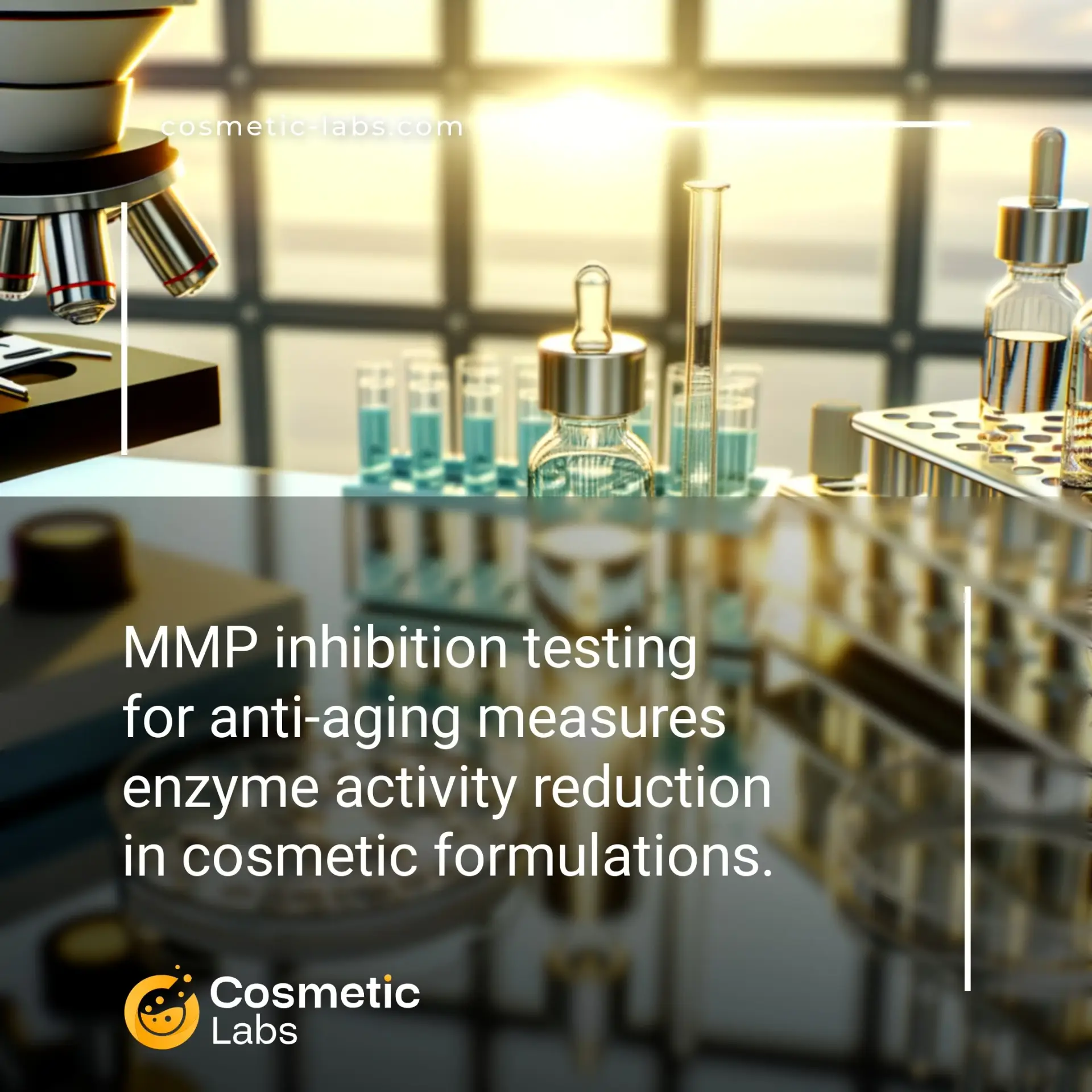MMP Inhibition Testing Services for Anti-Aging Products

What is Matrix metalloproteinases (MMPs) inhibition testing?
Matrix metalloproteinases (MMPs) inhibition testing is a preclinical assay that measures how effectively anti-aging ingredients block collagen-degrading enzymes in skin tissue. Labs use in vitro models with human dermal fibroblasts to evaluate ingredient potency, typically measuring MMP-1 and MMP-3 activity reduction percentages. This testing reveals whether your formulation can genuinely slow collagen breakdown—a key mechanism behind wrinkle formation that many brands overlook when developing age-prevention products.
Why do you need this service?
Beauty brands use MMP inhibition testing to validate collagen-boosting claims in serums and creams before market launch. Partner labs measure how your peptides, retinoids, or botanical extracts block collagen-degrading enzymes, providing quantifiable data for regulatory submissions and marketing materials. This testing also helps optimize active ingredient concentrations during formulation development, ensuring your anti-aging products deliver measurable results that justify premium pricing.
Who provides Matrix metalloproteinases (MMPs) inhibition testing services?
All cosmetic labs providing Matrix metalloproteinases (MMPs) inhibition testing services
There is no company providing these services at the moment.
Matrix Metalloproteinases (MMPs) Inhibition Testing for Anti-Aging Services
Matrix metalloproteinases (MMPs) inhibition testing measures your anti-aging ingredients’ ability to prevent collagen breakdown in skin. This preclinical testing helps brands validate product claims and optimize formulations before launching age-defying cosmetics.
In Vitro MMP Activity Assays
Labs use fluorogenic substrate assays to measure how well your ingredients block collagenase activity. These tests expose purified MMP enzymes to your formulations and track enzyme inhibition rates over time. Results show IC50 values that quantify your product’s potency against specific MMPs like MMP-1, MMP-2, and MMP-9.
Testing protocols include:
- Dose-response curves for ingredient concentration optimization
- Time-course studies measuring sustained inhibition
- Selectivity panels testing multiple MMP types
- Stability assessments under various pH conditions
Cellular MMP Expression Analysis
Cell-based assays evaluate how your ingredients affect MMP production in skin cells. Labs treat fibroblasts or keratinocytes with your formulations, then measure changes in MMP gene expression and protein secretion. This approach reveals whether your products work by reducing enzyme production or blocking existing enzymes.
Key measurements include:
- qPCR analysis of MMP-1, MMP-3, and MMP-13 mRNA levels
- ELISA quantification of secreted collagenases
- Western blot confirmation of protein expression changes
- Cytotoxicity screening to verify cell viability
Connect with specialized cosmetic labs on our platform to validate your anti-aging claims through rigorous MMP inhibition testing.
Practical Applications of MMP Inhibition Testing for Anti-Aging Products
MMP inhibition testing applications provide cosmetic brands with measurable data to validate anti-aging claims and optimize formulation effectiveness.
Collagen Protection Formulation Development
Labs use MMP-1 and MMP-3 inhibition assays to evaluate how well active ingredients protect collagen fibers from enzymatic breakdown. Testing protocols measure inhibition percentages at various concentrations, typically ranging from 0.1% to 5% active ingredient levels. Brands receive detailed dose-response curves showing optimal ingredient concentrations for maximum collagen protection.
This data supports wrinkle reduction claims and helps formulators balance efficacy with cost-effectiveness. Results guide ingredient selection between peptides, botanical extracts, and synthetic compounds based on their specific MMP inhibition profiles.
Elastin Degradation Prevention Studies
MMP-2 and MMP-9 inhibition testing evaluates ingredients targeting elastin preservation in skin tissue. Labs conduct time-course studies measuring elastase activity reduction over 24-72 hour periods. These tests identify ingredients that maintain skin elasticity and firmness by preventing elastin fiber degradation.
Testing results directly correlate with skin firmness improvements observed in clinical trials. Brands use this data to substantiate elasticity claims and develop targeted formulations for mature skin concerns.
| MMP Target | Primary Function | Testing Duration | Key Metrics |
|---|---|---|---|
| MMP-1 | Collagen I degradation | 24-48 hours | IC50 values, % inhibition |
| MMP-2 | Elastin breakdown | 48-72 hours | Elastase activity reduction |
| MMP-3 | Collagen III degradation | 24-48 hours | Dose-response curves |
| MMP-9 | Elastin fiber damage | 48-72 hours | Time-course inhibition |
Connect with specialized cosmetic labs on our platform to access MMP inhibition testing services that validate your anti-aging formulations with precise, regulatory-compliant data.
